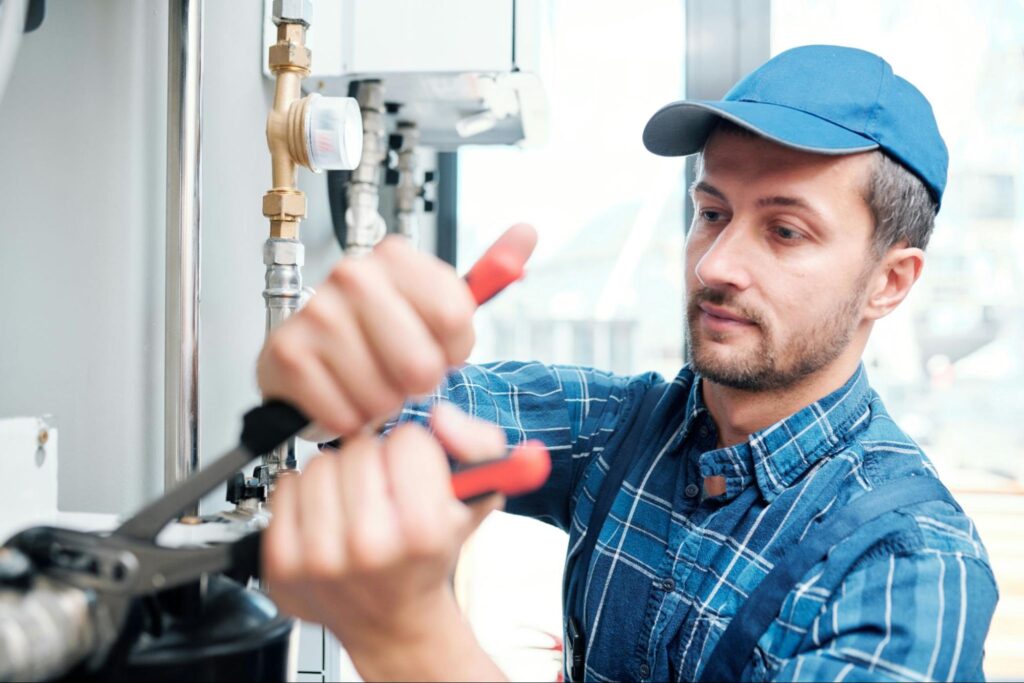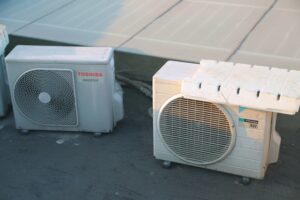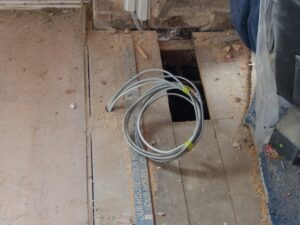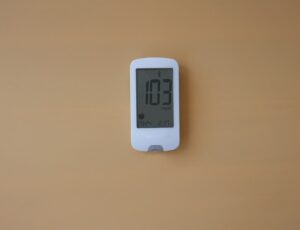When was the last time you gave your HVAC system a second thought?
If you’re like most, it’s probably when something goes wrong. But what if you could avoid the hassle and enjoy a perfectly comfortable environment all year round?
That’s where a skilled HVAC specialist comes in. Whether you’re looking to install a new system, need a quick repair, or just want routine maintenance, choosing the right professional can make all the difference.
Why settle for anything less than the best when it comes to your comfort?
At Excel Mechanical, we’re more than just HVAC specialists—we’re problem solvers who provide top-notch heating and cooling services for both residential and commercial clients. From ensuring your home stays warm in the winter to keeping your office cool in the summer, we tailor our services to meet your unique needs and budget.
So, what makes us stand out among HVAC specialists?
It’s our dedication to excellence, backed by years of experience and a commitment to high-quality service. We specialize in both residential and commercial systems, making sure your environment is always at the perfect temperature.
In this blog, we will cover:
- The basics of HVAC technology and its components.
- The key differences between residential and commercial HVAC systems.
- How to select the right HVAC specialist for your home or business.
Ready to dive deeper into how HVAC systems work and how they can be tailored to your space?
Keep reading to learn more about the basics of HVAC technology.
Understanding HVAC Systems
Knowing how HVAC systems operate and which type fits your needs is vital when choosing one. This includes understanding how basic HVAC technology works and recognizing the difference between residential and commercial systems.
Basics of HVAC Technology
HVAC stands for Heating, Ventilation, and Air Conditioning.
These systems regulate indoor temperature and air quality. Key components include a furnace or heat pump for heating, an air conditioner for cooling, ductwork for air distribution, and a thermostat for control.
An important aspect is energy efficiency. Modern systems often include programmable thermostats and variable-speed motors to reduce energy consumption. Routine maintenance and timely repairs ensure longevity and efficiency.
We provide expert service and installation, ensuring you choose a system tailored to your needs.
Difference Between Residential and Commercial HVAC
While residential and commercial HVAC systems share basic functions, they differ in size, complexity, and installation.
- Residential systems are generally smaller and simpler, focusing on single-family homes. They often include split systems with separate indoor and outdoor units.
- Commercial systems, however, are designed for larger spaces like offices or retail locations. They require more robust equipment to handle increased heating and cooling demands. These systems often incorporate packaged units placed on rooftops to save space.
Selecting the Right HVAC Specialist
When choosing an HVAC specialist, you must consider qualifications, experience, and services offered. Each factor ensures dependable and efficient service for your heating and cooling needs.
Qualifications and Certifications
Check for certifications from reputable organizations like NATE (North American Technician Excellence).
These credentials show that the technician has the necessary skills and training. A certified specialist ensures you get knowledgeable service, maximizing your system’s efficiency and lifespan.
Licensing is also crucial. Verify that the specialist holds proper state or local licenses. This guarantees they meet legal and safety standards.
Some regions require continuing education for license renewal, which keeps the specialist updated on the latest industry practices.
Experience and Expertise
Experience is vital in handling complex HVAC systems.
Look for specialists with several years of experience in residential and commercial sectors. An experienced technician is often better able to diagnose issues quickly and provide effective solutions.
Expertise in specific systems, such as central air conditioners, heat pumps, or furnaces, is also important. Specialists with broad experience can cater to different setups and preferences.
Consider reading customer reviews and testimonials. Happy customers often reflect high-quality work and attentive service.
Service Offerings
Evaluate the range of services, from installation to repair and maintenance, to ensure all your needs can be met.
Some specialists offer emergency services, which is crucial during unexpected breakdowns. Maintenance packages can be beneficial for regular check-ups and tuning. This often leads to cost savings and enhanced system performance.
A full-service provider tailors its solutions to fit individual needs and budgets, ensuring you receive the best possible system and service. This commitment extends to residential and commercial settings, reflecting their versatility and dedication to customer satisfaction.
Installation and Maintenance
Proper HVAC installation and maintenance are vital for system longevity and efficiency. Both residential and commercial systems require tailored approaches to meet distinct needs.
Residential HVAC Installation
In homes, each HVAC system should match the space’s specific requirements.
Factors like square footage, insulation, and home layout influence the type of system you need. Consider energy-efficient options, such as heat pumps or central air conditioning.
Working with experts ensures that installations are seamless and systems function efficiently. Excel Mechanical is committed to delivering high-quality installations that suit your home’s unique demands and budget.
Commercial HVAC Installation
Commercial properties demand robust and scalable HVAC solutions for larger spaces and varying occupancy levels. The systems must be efficient, reliable, and customizable to suit business needs.
Professionals evaluate building size, usage, and zoning to determine the ideal HVAC setup. We provide top-tier commercial HVAC installations focusing on durability and performance, ensuring your business environment remains comfortable and well-regulated.
Ongoing Maintenance and Repairs
Regular maintenance is essential for the longevity of any HVAC system.
Tasks such as changing filters, checking for leaks, and assessing wear on components help prevent breakdowns and costly repairs.
Scheduling routine check-ups ensures that your system runs efficiently and continues to meet your energy needs.
Energy Efficiency and Sustainability
Energy efficiency and sustainability in HVAC systems are essential for reducing costs and minimizing environmental impact. Implementing effective strategies can optimize HVAC performance while conserving resources.
Improving Energy Efficiency in HVAC Systems
To boost energy efficiency, start by ensuring your HVAC system is well-maintained.
Regular maintenance includes cleaning or replacing filters and checking for leaks. Programmable thermostats also help by adjusting temperatures based on your schedule.
Upgrade to high-efficiency systems to save energy. Look for units with a higher SEER (Seasonal Energy Efficiency Ratio) rating. The higher the rating, the more efficient the system is.
Zoned heating and cooling systems let you independently control temperatures in different areas, reducing unnecessary energy use.
Sustainable HVAC Solutions
Sustainable HVAC solutions focus on reducing environmental impact.
- Consider using geothermal systems that utilize natural heat from the ground. They are efficient and environmentally friendly.
- Solar-powered HVAC systems use solar panels to generate energy, decreasing reliance on non-renewable resources.
- Another option is heat pumps, which transfer heat instead of generating it, making them energy-efficient.
We help you choose and implement the best sustainable technologies, ensuring your system meets all comfort and environmental goals. You invest in quality, expertise, and future sustainability by choosing us.
Industry Innovations and Trends
In the world of HVAC, new technologies are reshaping how indoor environments are managed. From smart systems to advancements in both residential and commercial spaces, staying informed about the latest trends can help you make more efficient and cost-effective choices.
Smart HVAC Technologies
Smart HVAC systems have revolutionized temperature control in homes and businesses. These systems use intelligent thermostats and sensors to adjust settings based on your preferences, weather conditions, and occupancy.
This leads to better energy efficiency and reduced utility bills. Modern smart thermostats can be controlled remotely via smartphone apps, allowing you to change settings and monitor usage from anywhere.
By using smart technology, you can achieve optimal comfort while being environmentally conscious. These systems provide reliable performance and lasting value, ensuring your spaces remain comfortable year-round.
Future of HVAC in Residential and Commercial Spaces
The future of HVAC is moving towards environmentally friendly options, such as geothermal systems and heat pumps, which use less energy than traditional systems. Additionally, air purification and filtration innovations ensure better indoor air quality by removing pollutants and allergens.
For residential and commercial spaces, investing in energy-efficient and sustainable HVAC solutions reduces environmental impact and cuts costs in the long run.
Cost Considerations
When considering HVAC specialists, costs involve more than just price. It’s essential to evaluate project estimates, your system’s long-term value, and return on investment (ROI).
Estimating Project Costs
Understanding the costs associated with an HVAC project involves considering several factors.
- Installation costs can vary based on the complexity and size of the system. If ductwork needs to be updated or replaced, costs may increase.
- Equipment quality and brand also affect price. Higher-end models may have a larger upfront cost but offer better efficiency and longevity.
- It’s vital to consider any necessary maintenance plans which can help prevent future repairs.
Our transparent pricing ensures you know what to expect.
Understanding Value and ROI
Choosing an HVAC system is an investment in your property’s comfort and efficiency. While initial costs are significant, benefits such as energy savings and reduced repair bills can lead to a substantial return on investment over time.
Selecting a system with high energy efficiency ratings can lower utility bills. The choice isn’t just about upfront cost but the enduring value matching your specific needs.
Long-term savings and improved home comfort are key benefits to consider.
Safety and Regulations
Safety and regulations are crucial when it comes to HVAC installations and repairs. Understanding local laws and ensuring safety measures prevent accidents and ensure systems function optimally.
Compliance with Local Regulations
Adhering to local regulations ensures systems are legally and safely installed or serviced.
Each jurisdiction may have different rules about HVAC systems, so knowing these is essential. Meeting these regulations avoids penalties and ensures efficient and safe operation.
Hiring a company guarantees compliance with all local regulations, as the professionals know the specific rules in your area.
Ensuring Safety During Installations and Repairs
Safety during installations and repairs is vital.
Proper procedures minimize risks such as electric shocks, gas leaks, and equipment failures. Training technicians properly and equipping them with the necessary tools and protective gear is key.
Technicians ensure systems operate correctly and safely, reflecting their commitment to exceptional quality and great value.
Frequently Asked Questions
When it comes to HVAC systems, understanding the ins and outs can help you make more informed decisions. So, what exactly should you know? Below are some of the most common questions people have when choosing an HVAC specialist or maintaining their system:
What are the typical salaries for residential and commercial HVAC specialists?
Salaries for HVAC specialists can vary based on experience, location, and certifications. Due to the complexity and scale of the systems involved, residential specialists might earn slightly less than those working on larger commercial projects.
How do consumers generally rate the services of residential and commercial HVAC specialists?
Customers often rate HVAC specialists on service quality, punctuality, and efficiency. High ratings are common for companies that provide exceptional service and value for residential and commercial needs.
How can I find reputable residential and commercial HVAC specialists near me?
To find reputable specialists, consider checking online reviews, asking friends for recommendations, or visiting dedicated review platforms. We offer outstanding HVAC services known for their exceptional quality and value.
What are the current job opportunities for residential and commercial HVAC specialists?
The demand for HVAC specialists remains strong, especially in growing urban areas. Opportunities exist in residential and commercial sectors, with increased potential for sustainable and energy-efficient solutions.
Who are considered the best residential and commercial HVAC specialists in the industry?
The top specialists consistently deliver high-quality work and customer satisfaction. Excel Mechanical is recognized for offering top-tier HVAC services tailored to meet unique customer needs and budgets.
What factors contribute to determining the hourly rate charges by commercial HVAC companies?
Hourly rates are often influenced by project complexity, technician expertise, and geographical location. Additional services or advanced systems may also affect pricing.




